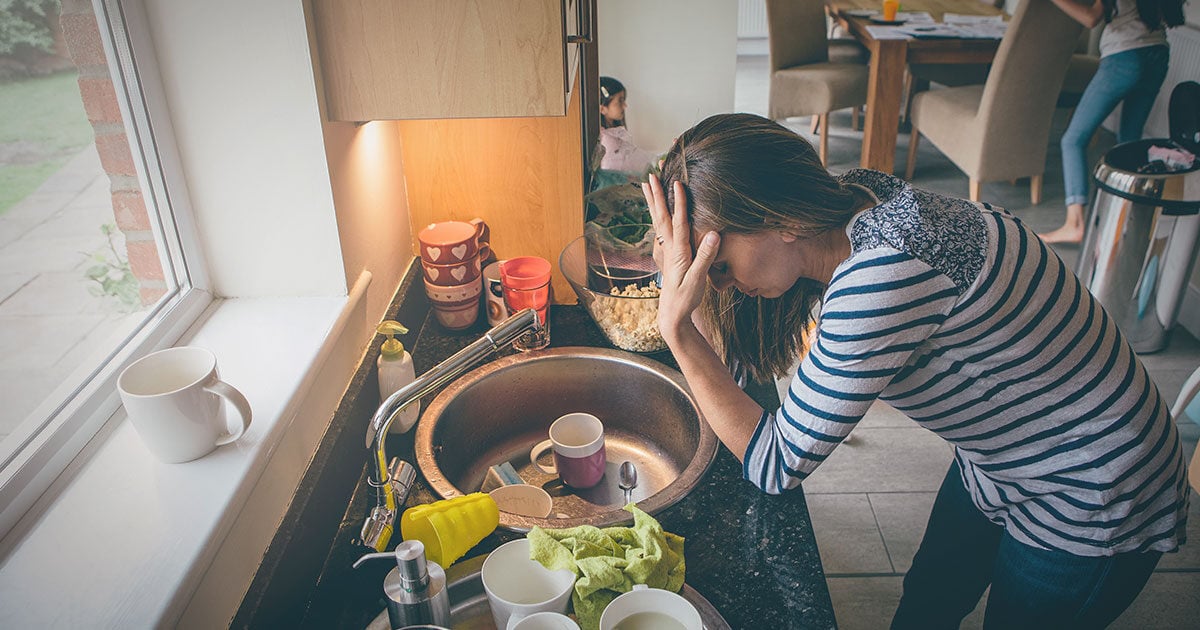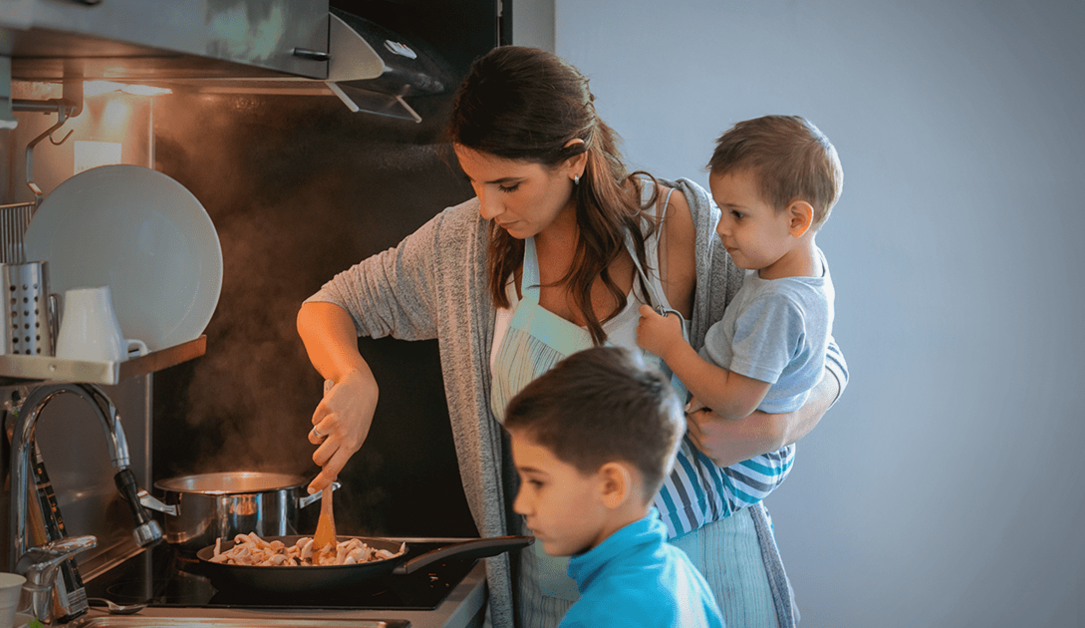What is it like to experience parental burnout? According to Procaccini and Kiefaber, it occurs in five progressive stages, each more stressful than the ones before. The first can be called the "Gung-Ho" stage. It may actually begin with the discovery of pregnancy and continue for several years. Very subtly, then, parents can move from the first to the second stage of burnout, which is characterized by persistent doubts.
They know something is definitely wrong at this point, but may fail to realize how rapidly they are losing altitude. They are frequently irritated by the children and find themselves screaming on occasion. Quite often they feel drained and fatigued. A full range of psychosomatic symptoms may come and go, including back and neck aches, upset stomach, ulcers and colitis, hypertension, headaches, diarrhea, and constipation. Still, the individual may wonder, "Why do I feel this way?" Not long ago I received a classic letter from a father in the second stage of parental burnout. This is what he wrote:
Dr. Dobson,
The Lord has blessed us so much, and I should be full of joy. But I have been depressed for about 10 months now.I don't know whether to turn to a pastor, a physician, a psychologist, a nutritionist, or a chiropractor.
Last September the Lord blessed us with a beautiful baby boy. He is just wonderful. He is cute and smart and strong. We just can't help but love him. But he has been very demanding. The thing that made it hardest for me was last semester Margie was taking classes three nights a week to finish her BA degree and I took care of little Danny. He cried and sobbed the whole time we were together. He would eventually go to sleep if I would hold him, but then I was afraid to put him down for fear he would wake up. I was used to being able to pay my bills, work out the budget, read, file mail, answer letters, type lists, etc., in the evening, but all this had to be postponed until Margie was here.
It was a real depressing time for me. I just couldn't handle all that crying. It was worse because Margie was breastfeeding him. I got very tired and started having a great deal of trouble getting up in the morning to go to work. I started getting sick very easily.
I have not been able to cope with these things. I really should be at work at 8:00, but I haven't been there before 9:00 or 9:30 in months. It seems like I'm always fighting the flu. I love our baby a lot and I wouldn't trade him for anything in the world. But I don't understand why I'm so depressed. Sure, Margie gets tired because we can't seem to get Danny to bed before 11 or 12 midnight and he wakes up twice per night to be fed. But she's not depressed. All this getting awakened at night really gets to me and I don't even have to get up to feed him.
Another thing that has been a constant struggle is leaving Danny in the nursery at church. He isn't content to be away from us very long so they end up having to track Margie down almost every Sunday. We hardly ever get to be together. This has been going on for 11 months now.
There are a couple of other things that probably contribute to my depression. They are (1) responsibilities at work; we're short-handed and I'm trying to do too much; (2) spending too many weekends with yard work or trying to fix up our fixer-upper house; and (3) our finances, which are very limited. Sixty-four percent of our income goes to pay for our house and there's not much left over. We don't want Margie to go to work, so we are on a meticulous budget. It's down to the bare essentials, now. I get so tired of that.
We have all the things we would ever dream of at our age (27). Our own neat little house in a good neighborhood, a job I consider a ministry. We have a fine healthy boy, each other, and not least of all, our life in Christ.
I have no reason to be depressed and tired all the time. I come home from work so exhausted that I don't even want Danny near me. He hangs on to Margie and she can't even fix dinner if I don't get him out of her hair. I just don't know how she stands it.
She must have a higher tolerance as far as not getting anything done is concerned.
If you have any insights as to what I should do, please let me know. Thanks and God bless you.
Jack
This young father of 27 years is well on the way toward burning out. The surprising thing is that Jack is bewildered by it. When one looks at his impossible schedule, it is no wonder that his mind and body are rebelling. After handling an extremely demanding job, he comes home to a fussy baby, a wife in night school, and mountains of bills and paperwork to do. On weekends he is rebuilding his run-down house! Finally, Jack made it clear that he and his wife have no time alone together, no fun in their lives, no social life, no regular exercise, and no escape from the baby. No wonder!!
In addition to his other pressures, Jack can't even get an uninterrupted night's sleep. He climbs into bed about midnight but is awakened at least twice before morning. That is probably the key to his depression. Some individuals are extremely vulnerable to loss of sleep and this man appears to be one of them. I am another. Our son, Ryan, did not sleep through the night once in his first four months, and I thought I was going to die. Do you remember what that was like with your newborns? There is no sound on earth quite like the piercing screech of an infant in the wee small hours of the morning. (Incidentally, people who say they "sleep like a baby" probably never had one.)
It may be impossible for this family to make immediate and sweeping changes in their lifestyle, but that's what is necessary to avoid greater problems. Margie is coping for the moment, but she will eventually crack too. I would recommend for starters that they postpone reconstructing their house, spending that money instead on childcare and weekend trips to the mountains or beach. They both desperately need at least one day a week away from the baby. Breastfeeding can be a problem, but there are solutions to it. Will the child scream when they leave? Yes. Will that hurt him? Not nearly as much as having parents who are too worn out to care for him.
What will happen if this couple does not find some source of relief? Well, fortunately, their baby will not always be so demanding. But toddlerhood lies ahead and new babies are always a possibility. If they continue to give out without taking in, they will slide from the second stage of burnout into the third. According to Procaccini and Kiefaber, this is the most critical phase. They called it the "transition stage" because decisions are usually made during this period that will determine the well-being of the family for years to come. They will either recognize the downward path they are on and make changes to reverse it, or else they will continue their plunge toward chaos.
What is felt during this third stage is indescribable fatigue, self-condemnation, great anger, and resentment. For the first time, a couple in this situation openly blames the kids for their discontent. One of the reasons they were so excited about parenthood was their idealistic expectation of what children are like. They honestly did not know that little boys and girls can be, and usually are, demanding, self-centered, sloppy, lazy, and rebellious. It wasn't supposed to be this way! In fact, they expected the kids to meet their needs for love and appreciation.
Instead, it's give! give! give! take! take! take! Depression and tears are daily visitors.
Pulling Away
The human mind will not tolerate that level of agitation for very long. It will seek to protect itself from further pain. As indicated earlier, this transition phase usually leads either to beneficial changes or to destructive self-defense. The latter occurs in Stage Four, which the authors call pulling away. The individual withdraws from the family and becomes "unavailable" to the children. The mother may not even hear them, even though they tug at her skirt and beg for her attention. She may slip into alcoholism or drug or tranquilizer abuse to dull her senses further. If forced to deal with the minor accidents and irritants of childhood, such as spilled milk or glue on the carpet, she may overreact violently and punish wildly. Fantasies of "slinging the brat against the wall" or "bashing him good" may recur in this angry and guilt-ridden parent. Obviously, child abuse is only an inch away. It occurs thousands of times daily in most countries.
If asked to explain what she is feeling, a mother in the fourth stage of burnout will say something like this, "I just can't deal with the kids right now." I counseled a woman in this situation who told me, referring to her children, "They hang around my ankles and beg for this or that, but I'll tell you, I kick 'em off. I'm not going to let 'em destroy my life!" She was a living, breathing stick of dynamite waiting to be ignited. People who reach this stage not only pull away from their children, but they tend to become isolated from their spouses and other family members too. Thus, being physically and psychologically exhausted, guilt-ridden to the core, drenched in self-hatred and disappointed with life, these parents descend into the fifth stage of burnout.
The Final Phase
The final phase, called "chronic disenchantment" by Procaccini and Kiefaber, is characterized by confusion and apathy. The individual at this stage has lost all meaning and purpose in living. Identity is blurred. Weeks may pass with nothing of significance being remembered. Sexual desire is gone and the marriage is seriously troubled. Recurring thoughts may focus on suicide, "cracking up", or running away. Clearly, this individual is desperately in need of counseling and a radical shift in lifestyle. If nothing changes, neither generation will ever be quite the same again.
And it is all so unnecessary!
Now let's take a closer look at the typical home today. Most of my readers will never reach the latter stages of burnout described above. Life is hard, but it isn't that hard. Some of you, however, will spend your parenting years in a state of general fatigue and stress, perhaps characterized by stage two. You'll crowd your days with unnecessary responsibilities and commitments that provide no lasting benefits. Precious energy resources will be squandered on that which only seems important at the moment.
Consequently, your parenting years will pass in a blur of irritation and frustration. How can you know if this is happening, even now? Well, continual screaming, nagging, threatening, punishing, criticizing and scolding of children is a pretty sure tip-off. There must be a better way to raise our sons and daughters.
One of the most common mistakes of young families is to duplicate the error of the young father who wrote to me. Jack and Margie attempted to accomplish too much too soon. I flinch when a newly married couple tells me they intend during their first two years together to go to school, have a baby, work full time, fix up a house, moonlight for extra money and teach Sunday school class.
It is a harebrained plan. The human body will not tolerate that kind of pressure. And when one's body is finally exhausted, an interesting thing happens to the emotions. They also malfunction.
You see, the mind, body, and spirit are very close neighbors and one usually catches the ills of the other. You'll recall that Jack did not understand his depression. He had every reason to be happy. He was miserable. Why? Because his depleted physical condition greatly affected his mental apparatus. And if the truth were known, his spiritual life probably wasn't all that inspiring either. The three departments of our intellectual apparatus are tightly linked and they tend to move up and down as a unit. (Remember how Elijah became depressed and wanted to die immediately after his exhausting confrontation with the prophets of Baal?) This is why it is so important for us to maintain and support the triad: mind, body, and spirit. If one breaks down, the entire engine begins to sputter.
In summary, I join the authors of Parent Burnout in urging you to use your physical resources carefully and wisely in the years ahead. Raising children is not unlike a long-distance race in which the contestants must learn to pace themselves. If you blast out of the blocks as though you were running a sprint, you will inevitably tire out. You'll gasp and stumble as the road winds endlessly before you. Then when you come to heartbreak hill, better known as adolescence, there will be no reserve with which to finish the course. Parenting, you see, is a marathon, and we have to adopt a pace that we can maintain for two or even three decades. That is the secret of winning.
A balanced life makes that possible!
From Dr. Dobson's book, Parenting Isn't for Cowards.












